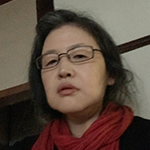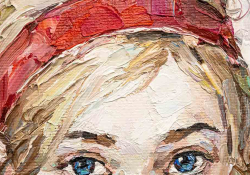Death Valley
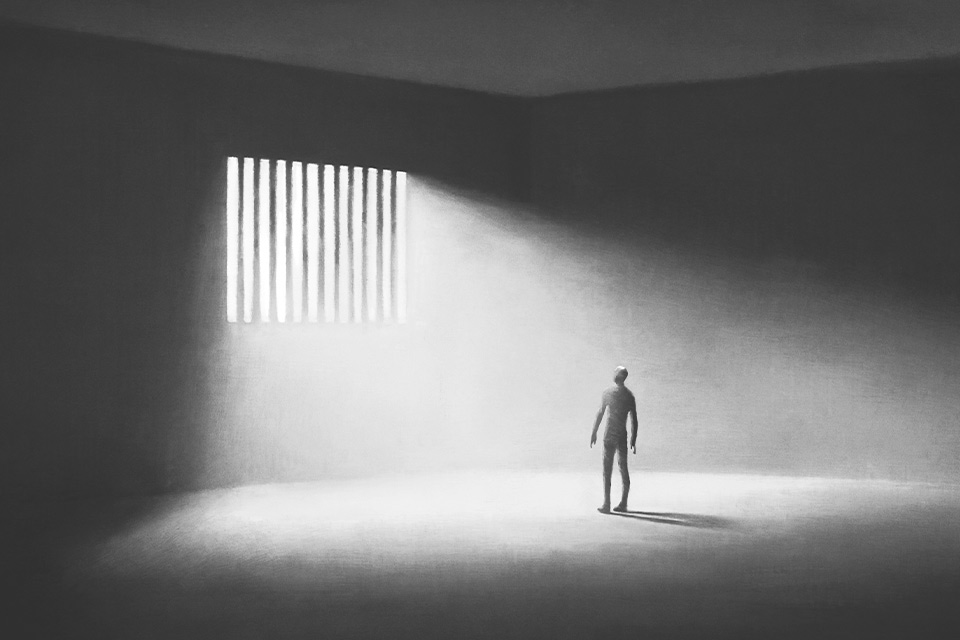
Three groups of children dine at long tables inside cages in this claustrophobic tale of no escape.
We, my brothers and sisters and I, have broad dining tables.
The first thing you would see, entering the dimly lit refectory, are endless rows of shelves lined with jars of preserves; way up above the shelves is a high window that doesn’t open, and the ceiling beyond that is too far away to see clearly.
The three big tables stand in the middle of the room: these are our dining tables.
All of us children are grouped by age: the ones who are still little at the table on the left, by the wall with the window; the biggest teens at the table on the right, and the ones in-between at the middle table. On the plastered walls, the alabaster paint is flaky and peeling. The shelves with the jars and the three hemispherical iron cages that cover each table are painted the same white as the walls, and thick with dust. The light from the high window shines only on the tables.
I don’t know what age I am. The big girls, who might be fourteen or seventeen years old, have to help the mothers and cook, but I don’t have to, so I must not be a big girl, but I don’t scamper around like the little ones either.
I’m not sure which table I should go to, so I unlatch the cage around the little ones’ table, and from the many large bowls that cover it, I fill my small dish with food. Chunks of reeking fish bob beneath the surface of the broth, and a sharp sprig of rosemary embeds itself in my lip. How revolting it is. Given that it’s all made from scratch by our mothers, even the seasonings, the mayonnaise and the herbs, it’s incredible how bad it is.
Our mothers bustle around, bringing food from the kitchen. They have blonde braids and are swathed in long, filthy dresses. The modest busts of their dresses are all bursting at the seams; their throats and bosoms are adorned with high ruffled collars, with ribbons or flower corsages. The lace of the sleeves is tatted from hempen yarn. Their forearms, pale and saggy with bulging blue veins, peekaboo through the picots in the lace.
“Those were wedding dresses,” a girl had once whispered to me; she must've been my sister, but I couldn’t tell if she was older or younger. I didn’t know the girl’s name. I hardly recognize any of the children around me anymore.
Whenever a mother, laden down with bowls of food, stoops low to pass through the door from the kitchen to the refectory, the hem of her dress drags along the floor. If they really were wedding dresses, were they white once? Now they’re a murky grayish-brown, like the food. The cloth tacked on at the front to cover the mothers’ grotesquely swollen bellies is crudely woven, a coarse mesh. But newer and cleaner.
The little boys wear collared shirts and shorts, the bigger boys wear long trousers, and the girls wear shapeless linen shift dresses.
Once, a little one got a sprig of herb in his throat and choked to death.
* * *
“Jenny.”
It’s my brother Johnny calling my name: he’s the same age as me. Our names both start with J, which means we were born in the same year. Because there are so many of us children, the only one I really talk to is Johnny.
“There’s poison or drugs in the food,” he whispers in my ear.
A boy is playing a slow, mournful tune on a violin. Holding hands, the big girls trudge in a circle around their table on the right side of the room, grass-green dresses swaying.
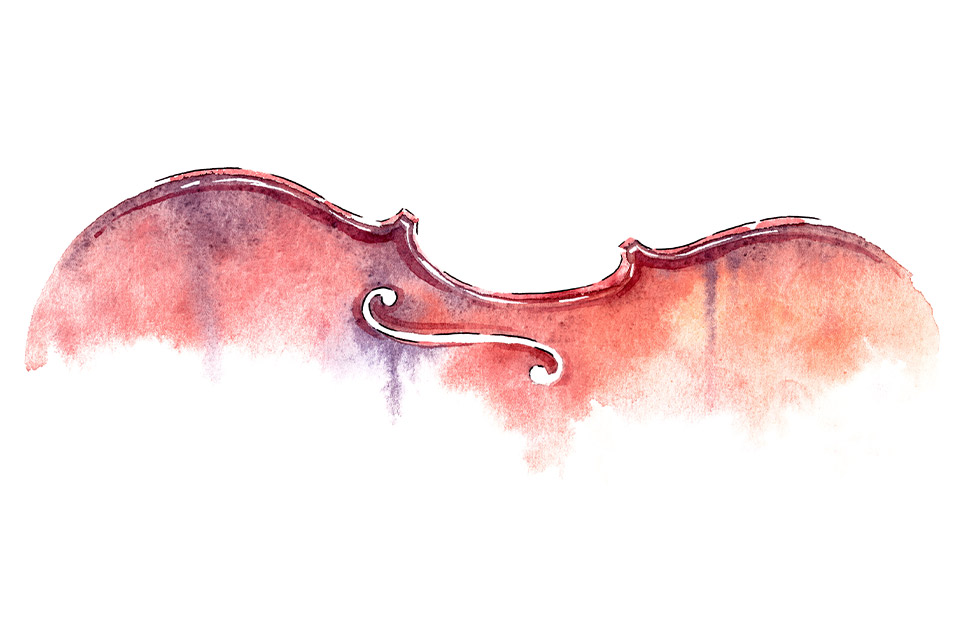
A boy is playing a slow, mournful tune on a violin.
Johnny says, “If we survive this table, we can move on to the next.”
“How old are we again?”
“Fourteen. You’re already doped up to the gills, huh.”
Johnny's getting too big for his britches. He makes a few more impertinent comments as he chews on mangled pieces of fish, dripping with broth. He crushes a tangle of fetid stinkweed and fine bones between his strong teeth. Isn’t he drugged up too?
“Fourteen? Then we gotta go to the next table,” I say.
We’re inside the huge birdcage, decorated with colored clay roses, that surrounds the dining table. We can unlatch the cage door as we like.
Johnny and I leave the little ones’ dining cage and go into the middle cage. Almost all the plates have already been cleared, and I use my fork to rescue a few flaccid noodles left at the bottom in the glop.
I wonder if it’s like Johnny says: I’ll die if I keep eating this.
* * *
When the door to the outside swings open, all the children cringe. The violin trails off.
Father’s come home. Our father is disheveled, his shirt missing buttons, his face stubbled blond. Once, a boy had commented on our father’s appearance and was force-fed iron tacks until he died.
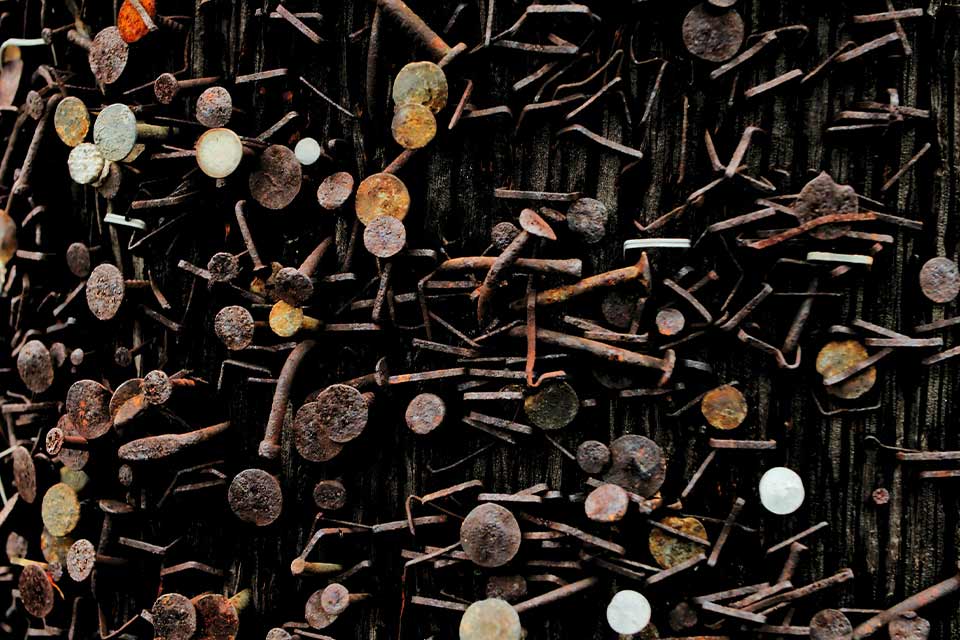
Once, a boy had commented on our father’s appearance and was force-fed iron tacks until he died.
Our father raises his hand and in cheerful tones calls out to us children and our mothers. “Today I’ve brought you all a new father.”
He takes the man by the shoulder to guide him through the doorway. The new father is black-haired and swarthy with cruel eyes. He might be handsome. But our father has always told us that people with black hair are born full of sin and inferior.
“These are your new father’s children.”
All at once, dozens of black-haired, black-clad children swarm in, dive willy-nilly into the cages around the three tables, grab the remaining bowls, and lick them hungrily.
Johnny peers into my eyes. “Jenny, we have to go to the last table now.”
I don’t feel like eating anymore. “No, I won’t.”
Girls who go to that table have to cook with the mothers.
I don’t want to. Even if I have to do it someday, it doesn’t have to be today. The black-haired kids are pushing and shoving. Their hair is thick, stiff and rank. It doesn’t look like they wash.
Johnny says coolly, “Bad blood thins after a few generations.”
He lopes into the cage around the last table, the one on the right, reserved for the biggest teens. He shoulders the black-haired newcomers out of the way, punching any who turn on him.
“Play,” he orders the boy with the violin, and the exquisite music strikes up again.
Johnny collects what remains of the rank food into a single dish, sits on the table, and eats. He lords it over the table like a king. On the white tablecloth, he writes his own name in orange sauce.
Our father and the new father aren’t in the refectory; the door is shut. I can’t stand the way the black-haired children are slathering their tongues on the dishes, so I leave the dining table cage and open the door that leads out of the refectory, where my father had looked in just now.
It’s the first time I’ve ever been outside. I emerge into a place like the bottom of a pool without any water in it, surrounded on all sides by concrete walls that loom high above my head.
Our house is made of concrete. Apart from the concrete, all I can see is the sky. It’s a fearful blue thing, forcefully clamping down over our house, that might suck me up into it if I get too close.
In the corner opposite the refectory door, under the sky next to the wall, my father and the new father are tongue-kissing, locked in an embrace. A few paces away, a mother in an ankle-length dress is standing in a trance. It’s the mother who’s not right in the head. Our father has told us she’s possessed by evil spirits. I guess Johnny would say it’s the drugs.
Our father moves his face away from the new father’s and says to the mother, “——— is a skilled carpenter.”
Even if he’s a skilled carpenter, he has black hair, so he must be a bad man. But the mother says nothing, only nods. I wonder where the new father came from. On the walls of the empty pool, there’s no ladders or doors, just the steep walls on every side, and I can’t see anything except sky above the walls.
The new father notices me and asks, “How old is that girl?”
“There’s a child here?”
I can see our father getting angry.
“She’s not wearing a nametag,” he says. “I don’t know her name.”
I flee back into the refectory. Our father and the new father are chasing me. As soon as they stride through the door, Johnny pounces from behind a shelf of condiments and medicines and stabs into father’s jugular with a silver knife. Our father collapses on the wooden refectory floor. Blood gushes from his neck, and he convulses.
* * *
The mothers and older girls tuck up their long skirts and rush to the kitchen. The new father hugs Johnny and congratulates him, praising his bravery.
The brother, who killed our father, will now become my father. A remembrance of the old king’s reign will now flow into our flesh, our bodies that die and are reborn.
A remembrance of the old king’s reign will now flow into our flesh, our bodies that die and are reborn.
The mothers bring basins, pots, and knives back from the kitchen and flock in around our old father, who’s started to succumb to death, huddled and hunched over like a rat; they use the knives to slice into his neck, arms, and legs and catch the blood that spills out in the basins and pots. All the blood in the basins and pots gets poured into big earthenware jugs.
The three tables with their cages are cleared away, and in the middle of the refectory, we place our old father and all the jugs.
The violin’s tune segues into a march. The new father’s black-haired children start to smash cymbals together. The little ones jump around and dance. One of the mothers scoops bright ruby blood from an earthenware jug, dishes it into a wooden bowl, and hands it to Johnny. He sips.
The new father, the mothers, and children stand in a circle with the jugs of blood at the center and pass the bowl around to the music. I drink it too. Slurping down as much as I can, while taking care not to drain the whole bowl, whenever it’s handed back to me.
It’s a treat that we only get to have on special occasions.
. . . but sometimes, I feel there might be fewer siblings and mothers than there were. Maybe for the fathers, it’s not all that special.
I’ll try to count the children, now that our family’s all gathered together.
Starting from the boy playing the violin, one, two. The gaps between claps and cymbal crashes are getting shorter. The bowl comes around to me swiftly, and each gulp of blood is so heady that I forget which child I’m up to.
Johnny comes up to me, arm in arm with the new father. “Jenny, from now on you eat at the big kids’ table.”
The new father adds, “You have to cook, too. Weave cloth, make preserves. The old mothers should teach you.”
“And from tonight,” Johnny says, “you sleep in the same room with me and the new father.”
I feel such fear, I try to run away outside.
Again, I arrive at the same square, empty space where concrete plasters over everything except the sky. All I can do is go back to the refectory.
There must be a secret way out of this empty space, I think. Otherwise, how could the new father have gotten in here? But I guess it’s only boys who can find that secret way out.
The mothers and the big girls are completely disemboweling our old father, taking his heart and entrails and putting them in jars. They might make blood sausage. For our holy wedding ceremony, the three of us.
I look down at my dress. It’s a linen shift one of the mothers made for me, completely plain and unadorned. Johnny tells me that before nightfall, I have to decorate the dress, at least sew on a collar.
Translation from the Japanese

